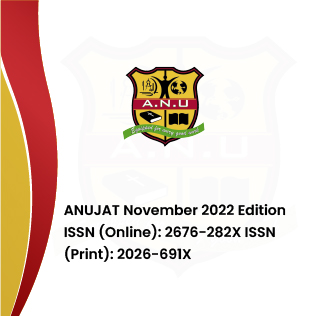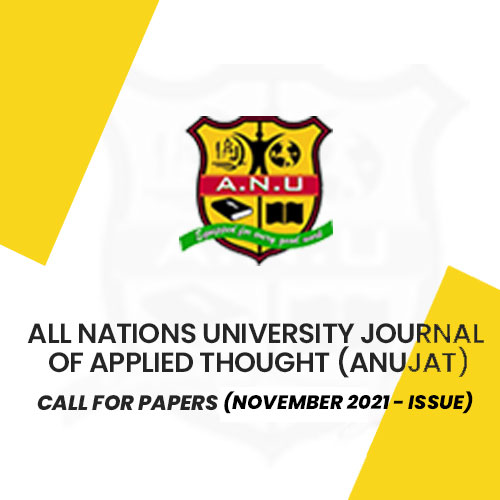Ethic and best practices
These Best Practice Guidelines on Publication Ethics have been written to offer author(s) a framework for developing and implementing their own publication ethics policies and systems. Editors from All Nations University Journal of Applied Thought (ANUJAT) trust peer reviewers to provide fair assessments, authors trust editors to select appropriate peer reviewers, and readers put their trust in the peer-review process. Editors from ANUJAT believe good decisions and strong editorial processes designed to manage these interests will foster a sustainable and efficient publishing system, which will benefit academic societies, journal editors, authors/researchers,
research funders, readers, and publishers. Good publication practices do not develop by chance, and will become established only if they are actively promoted.
Author(s) of the paper(s)
The list of authors should accurately reflect who did the work. All published work should be attributed to one or more authors. ANUJAT instructions for authors explain the concepts of academic authorship, setting out which contributions do and do not qualify for authorship. The editors of ANUJAT ask for a declaration that all authors meet the journal’s criteria for authorship and that nobody who meets these criteria has been omitted from the list (Submission Preparation Checklist). If an authorship dispute emerges after publication (for example, somebody contacts the editor claiming they should have been an author of a published paper, or requesting that their name be withdrawn from a paper), the editors of ANUJAT contact the corresponding author and, where possible, the other authors to establish the veracity of the case.
Publication of papers that have not been published before
ANUJAT considers only work that has not been published elsewhere. One reason for this is that the scientific literature can be skewed by redundant publication, with important consequences, for example, if results are inadvertently included more than once into meta-analyses. ANUJAT asks authors for a declaration that the submitted work and its essential substance have not previously been published and are not being considered for publication elsewhere (Authors Guidelines). If a primary research report is published and later found to be redundant (i.e. has been published before), the editor contacts the authors and considers publishing a notice of redundant publication. The editors of ANUJAT have a right to demand original work and to question authors about
whether opinion pieces (for example, editorials, letters, non-systematic reviews) have been published before.
Promoting research integrity
Research misconduct
If the editors of ANUJAT suspect research misconduct (for example, data fabrication, falsification or plagiarism), they should attempt to ensure that this is properly investigated by the appropriate authorities. Peer review sometimes reveals suspicion of misconduct. If peer reviewers raise concerns of serious misconduct (for example, data fabrication, falsification, inappropriate image manipulation, or plagiarism), these should be taken seriously. However, authors have a right to respond to such allegations and for investigations to be carried out with appropriate speed and due diligence.
Protecting the rights of research participants/subjects
Editors of ANUJAT create publication policies that promote ethical and responsible research practices. The editors seek assurances that studies have been approved by relevant bodies. If human participants were involved, manuscripts must be accompanied by a statement that the experiments were undertaken with the understanding and appropriate informed consent of each. Editors reserve the right to reject papers if there is doubt whether appropriate procedures have been followed. If a paper has been submitted from a country where there is no ethics committee, institutional review board, or similar review and approval, editors should use their own experience to judge whether the paper should be published. If the decision is made to publish a paper under these circumstances a short statement should be included to explain the situation. In the majority of cases, editors should
only consider publishing information and images from individual participants where the authors have obtained the individual’s explicit consent.
Respecting cultures and heritage
Editors of ANUJAT exercise sensitivity when publishing images of objects that might have cultural significance or cause offence (for example, Australian aboriginal remains held in museums, religious texts, historical events).
Informing readers about research and publication misconduct
Editors inform readers if ethical breaches have occurred. ANUJAT publishes corrections (errata) when errors could affect the interpretation of data or information, whatever the cause of the error (i.e. arising from author errors or from editorial mishaps). Likewise, ANUJAT publishes ‘retractions’ if work is proven to be fraudulent, or ‘expressions of concern’ if editors have well-founded suspicions of misconduct. The title of the erratum, retraction, or expression of concern includes the words ‘Erratum’, ‘Retraction’, or ‘Expression of concern’. It is published on a numbered page (print and electronic) and should be listed in the ANUJAT’s table of content. It enables the reader to identify and understand the correction in context with the errors made, or explains why the article is being retracted, or explains the editor’s concerns about the contents of the article. It is linked electronically with the original electronic publication.
Peer-review systems
Editors of ANUJAT have a responsibility for ensuring the peer-review process is fair and should aim to minimize bias. Editors have chosen a peer-review system that best suits ANUJAT. Our
system is a blind peer review process. The material that has not been peer reviewed is clearly identified. If discussions between an author, editor, and peer reviewer have taken place in confidence, they remain in confidence unless explicit consent has been given by all parties or there are exceptional circumstances. Editors or board members are never involved in editorial decisions about their own work.
Peer reviewer selection and performance
Editors of ANUJAT have a responsibility to ensure a high standard of objective, unbiased, and timely peer review. Editors monitor the performance of peer reviewers/editorial board members and record the quality and timeliness of their reviews. Peer reviewers who repeatedly produce poor quality, tardy, abusive or unconstructive reviews are not used again. Editors of ANUJAT encourage peer reviewers to identify if they have a conflict of interest with the material they are being asked to review, and editors ask that peer reviewers decline invitations requesting peer review where any circumstances might prevent them producing fair peer review.
Timing of publication
Editors of ANUJAT aim to ensure timely peer review and publication for papers they receive, especially where, to the extent that this can be predicted, findings may have important implications. Authors should be aware that priority publication is most likely for papers that, as judged by the journal’s editorial staff, may have important implications.
Appeals
Authors have a right to appeal editorial decisions. ANUJAT establishes a mechanism for authors to appeal peer review decisions. Editors mediate all exchanges between authors and peer reviewers during the peer-review process. If agreement cannot be reached, editors consider inviting comments from additional peer reviewer(s), if the editor feels that this would be helpful.
Conflicts of interest
Editors, authors, and peer reviewers have a responsibility to disclose interests that might appear to affect their ability to present or review data objectively. These include relevant financial (for example, patent ownership, stock ownership, consultancies, speaker’s fees), personal, political, intellectual, or religious interests. The editors of ANUJAT require statements about conflicts of interest from authors. Editors should explain that these statements should provide information about financial (for example, patent ownership, stock ownership, consultancies, speaker’s fees), personal, political, intellectual, or religious interests relevant to the area of research or discussion.
Editorial independence
Editorial independence is respected. Journal publishers do not interfere with editorial decisions. The relationship between the editor and the journal publisher is set out in a formal contract and an appeal mechanism for disputes is established. All Nations University, as the publisher of ANUJAT, works with the journal editors to set journal policies appropriately and aim to meet those policies, particularly with respect to: editorial independence; research ethics(including confidentiality, consent, and the special requirements for research in social sciences); authorship; transparency and integrity (conflicts of interest, research funding, reporting
standards); peer review (for further information concerning responsibilities in relation to peer review process.
Accuracy
The editors of ANUJAT have a responsibility to ensure the accuracy of the material they publish. ANUJAT encourages authors and readers to inform them if they discover errors in published work. We publish corrections if errors are discovered that could affect the interpretation of data or information presented in an article. Corrections arising from errors within an article (by author(s) or journal) are distinguishable from retractions and statements of concern relating to misconduct.
Academic debate
ANUJAT encourages academic debate. ANUJAT encourages correspondence commenting on published items and should always invite authors to respond to any correspondence before publication. However, authors do not have a right to veto unfavorable comments about their work and they may choose not to respond to criticisms.
Responsible publication practices
Editors of ANUJAT pursue cases of suspected misconduct that become apparent during the peer-review and publication processes. In instances of confirmed misconduct, editors may consider imposing sanctions on the authors at fault for a period of time. Sanctions must be applied consistently. Before imposing sanctions, editors formally define the conditions in which they will apply (and remove) sanctions, and the processes they will use to do this.
Plagiarism and copyright
ANUJAT editors and readers have a right to expect that submitted work is the author’s own, that it has not been plagiarized (i.e. taken from other authors without permission, if permission is required) and that copyright has not been breached (for example, if figures or tables are reproduced). We ask authors to declare that the work reported is their own and that they are the copyright owner. Papers are revised with Similitary Check to avoid plagiarism. In case of plagiarism, the author could state the situation through the e-mail: [email protected]
Protecting intellectual property
ANUJAT authors have a right to protect their intellectual property. ANUJAT licenses content from authors, they have the copyright of their papers. The authors may transfer the copyright from their papers to the editors of ANUJAT.
Peer reviewer conduct and intellectual property
Authors are entitled to expect that peer reviewers or other individuals privy to the work an author submits to ANUJAT will not steal their research ideas or plagiarize their work. ANUJAT explains to peer reviewers that material is in confidence until it has not been published. Editors of ANUJAT protect peer reviewers from authors and, even if peer reviewer identities are revealed, should discourage authors from contacting peer reviewers directly, especially if misconduct is suspected
Plagiarism Policy
ANUJAT and its readers have a right to expect that submitted work is the author’s own, that it has not been plagiarized (i.e. taken from other authors without permission, if permission is required) and that copyright has not been breached (for example, if figures or tables are reproduced).
We ask authors to declare that the work reported is their own and that they are the copyright owner. Papers are revised with Similitary Check to avoid plagiarism. In case of plagiarism, the author could state the situation through the e-mail: [email protected]
If the editors of ANUJAT suspect research misconduct (for example, data fabrication, falsification or plagiarism), they should attempt to ensure that this is properly investigated by the appropriate authorities. Peer review sometimes reveals suspicion of misconduct.




